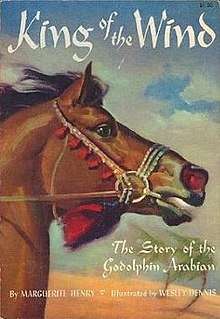King of the Wind
King of the Wind is a novel by Marguerite Henry that won the Newbery Medal for excellence in American children's literature in 1949.[1] It was made into a film of the same name in 1990.[2]
 First edition | |
| Author | Marguerite Henry |
|---|---|
| Illustrator | Wesley Dennis |
| Country | United States |
| Language | English |
| Publisher | Rand McNally |
Publication date | 1948 |
| Media type | Print (hardback & paperback) |
| ISBN | 0-7862-2848-2 (reissue) |
Plot
The story starts in Morocco, as the fast of Ramadan is ending. Agba, a mute slave boy, tends to his favorite Arabian mare, who gives birth that night. The colt has a white spot on his hind heel, considered the emblem of swiftness and good luck, but a wheat ear on his chest, symbolizing bad luck. The mare dies within a few days, but Sham matures into a promising racehorse. Later on, the Sultan summons six horseboys to his palace, including Agba, and charges them to accompany six horses that are to be given as gifts to the French King Louis XV. The horseboy is to remain with that horse until the horse's death, then return to Morocco.
When the racehorses arrive in France, they are frowned upon by the French, who believe that they are not 'lusty' enough to be racehorses. Sham becomes a kitchen horse but is so disobedient that the cook sells him to a carter. Agba becomes a servant to Sham's new owner and meets Grimalkin the cat along the way.
Sham is bought by a Quaker man and taken to England. When Sham refuses to let the Quaker's nephew ride him, his owner sells him to an inn. Agba is jailed when he is caught sneaking into the inn to see Sham, but the Quaker's housekeeper bails him out and both Sham and Agba are released into the service of the Earl of Godolphin.
The Earl treats Sham as a workhorse, albeit kindly. Lady Roxana, a mate meant for Hobgoblin, arrives, and Sham successfully fights Hobgoblin for her. Lady Roxana enjoys Sham's company, but the Earl is embarrassed by the incident. He sentences Sham, Agba, and Grimalkin to life in Wicken Fen, and they depart.
Two years later, the Earl's Chief Groom comes to see Agba and reveals that Lady Roxana gave birth to Sham's son Lath, who was left untrained. Lath one day jumped a fence and outran some of the colts that the Earl was training.
The trio come back to Godolphin, and Sham is named the Godolphin Arabian. After the Earl reveals that he is near bankruptcy, they race Sham's sons at Newmarket. The sons win the races and the Queen's purse, thus repairing the Earl's fortunes and establishing Sham as one of the founding stallions of English track racing.
References
External links
| Awards | ||
|---|---|---|
| Preceded by The Twenty-One Balloons |
Newbery Medal recipient 1949 |
Succeeded by The Door in the Wall |